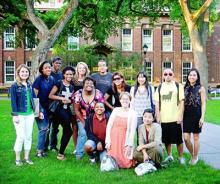Research in the humanities is frequently misunderstood. When we think of research, what immediately comes to mind for many of us is a laboratory setting, with white-coated scientists hunched over microscopes. Because research in the humanities is often a rather solitary activity, it can be difficult for newcomers to gain a sense of what research looks like within the scope of English Studies.
A common misconception about research is reinforced when we view it solely in terms of the discovery of things previously unknown (such as a new species or an archaelogical artifact) rather than as a process that includes the reinterpretation or rediscovery of known artifacts (such as texts and other cultural products) from a critical or creative perspective to generate innovative art or new analyses. Fundamental to the concept of research is precisely this creation of something new. In the humanities, this might consist of literary authorship, which creates new knowledge in the form of art, or scholarly research, which adds new knowledge by examining texts and other cultural artifacts in the pursuit of particular lines of scholarly inquiry.
Research is often narrowly construed as an activity that will eventually result in a tangible product aimed at solving a world or social problem. Instead, research has many aims and outcomes and is a discipline-specific process, based upon the methods, conventions, and critical frameworks inherent in particular academic areas. In the humanities, the products of research are predominantly intellectual and intangible, with the results contributing to an academic discipline and also informing other disciplines, a process which often effects individual or social change over time.
The Office of Undergraduate Research provides this basic definition of research:
"Very generally speaking, most research is characterized by the evidence-based exploration of a question or hypothesis that is important to those in the discipline in which the work is being done. Students, then, must know something about the research methodology of a discipline (what constitutes "evidence" and how do you obtain it) and how to decide if a question or line of inquiry that is interesting to that student is also important to the discipline, to be able to embark on a research project."
While individual research remains the most prevalent form in the humanities, collaborative and cross-disciplinary research does occur. One example is the "Modern Girl Around the World" project, in which a group of six primary UW researchers from various humanities and social sciences disciplines explored the international emergence of the figure of the Modern Girl in the early 20th century. Examples of other research clusters are "The Race/Knowledge Project: Anti-Racist Praxis in the Global University," "The Asian American Studies Research Cluster," "The Queer + Public + Performance Project," "The Moving Images Research Group," to name a few.
English Studies comprises, or contains elements of, many subdisciplines. Each UW English professor engages in research in one or more specialty areas. You can read about English faculty specializations, research, and publications in the English Department Profiles to gain a sense of the breadth of current work being performed by Department researchers.
Undergraduates embarking on an independent research project work under the mentorship of one or more faculty members. Quite often this occurs when an advanced student completes an upper-division class and becomes fascinated by a particular, more specific line of inquiry, leading to additional investigation in an area beyond the classroom. This also occurs when students complete the English Honors Program, which culminates in a guided research-based thesis. In order for faculty members to agree to mentor a student, the project proposal must introduce specific approaches and lines of inquiry, and must be deemed sufficiently well defined and original enough to contribute to the discipline. If a faculty member in English has agreed to support your project proposal and serve as your mentor, credit is available through ENGL 499.
Beyond English Department resources, another source of information is the Office of Undergraduate Research. Another great campus resource is the Simpson Center for the Humanities which supports interdisciplinary study. A number of our students have also been awarded Mary Gates Research Scholarships.
Each year, undergraduate English majors participate in the UW's Annual Undergraduate Research Symposium as well as other symposia around the nation.
Check out Past Honors Students' Thesis Projects.
